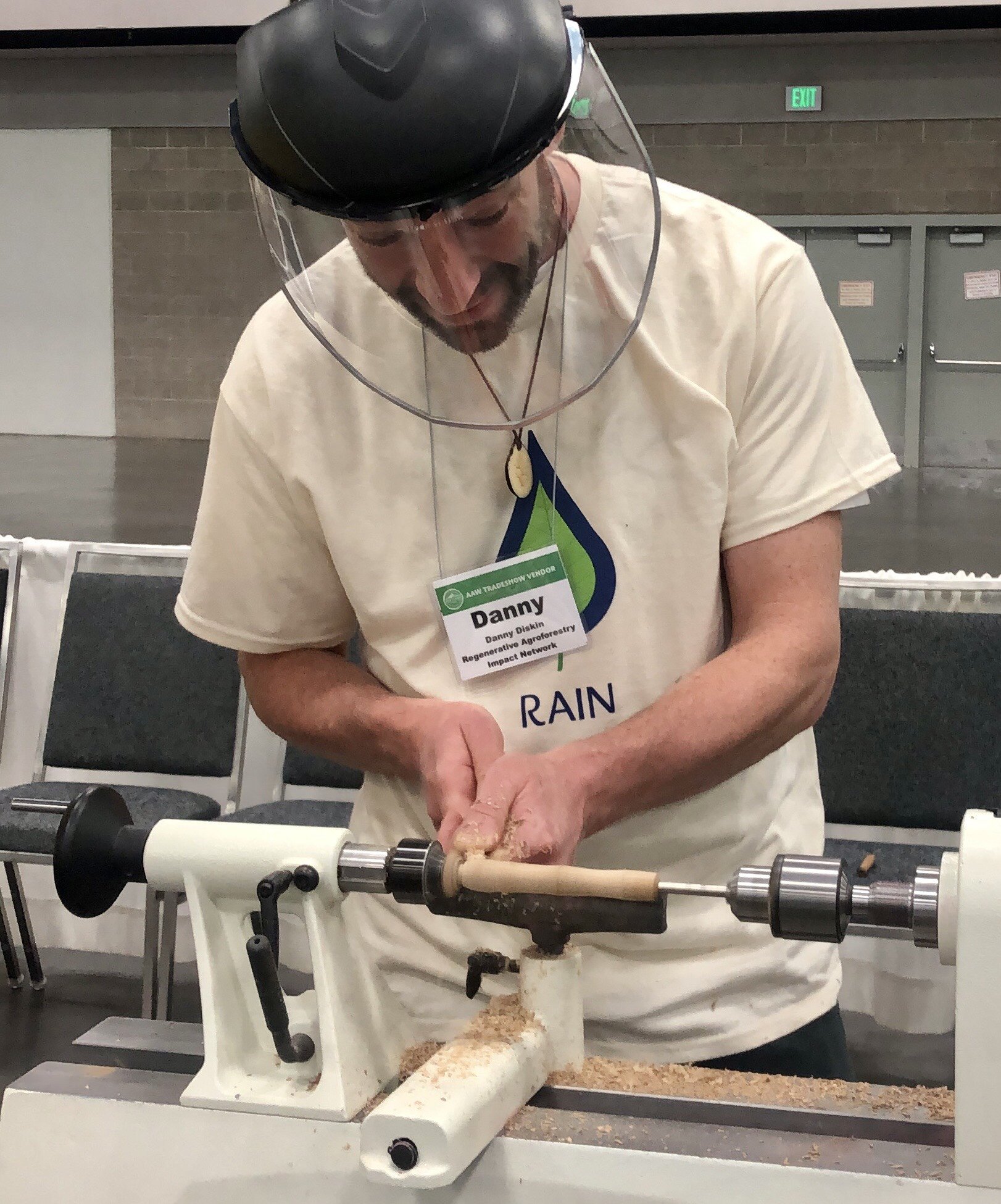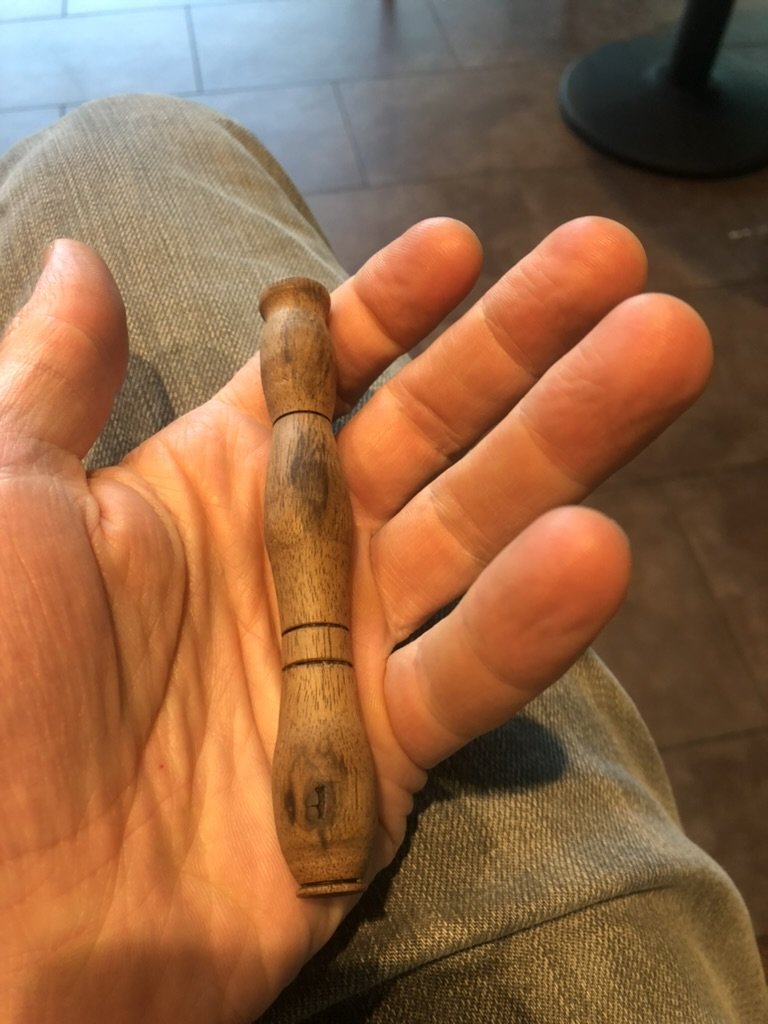Turning Toward Tropical Trees: Becoming Rainforest Ambassadors
Following the grain
Woodturning is a very particular passion, and its practitioners gather to share their hobby at the annual symposium of the American Association of Woodturners. This year’s event brought together 1200 artists, craftspeople and collectors, with guest speaker and forest ecologist Dr. Nalini Nadkarni giving the keynote address. Nalini gave a fascinating talk, drawing out the connection between her hobby at the lathe and her work in the canopy of the Costa Rican rainforest.
Watch Nalini’s presentation:
RAIN is all about making connections between different cultures and ways of thinking, all in the service of ecosystem and cultural regeneration. Nalini was inspired by one of the projects on the network: our work bringing classical musicians to reforestation by planting the endangered species used to make violin bows. She invited me to the symposium, and I may have been the only person there who had never touched a lathe.
It’s not exactly meditation, but sitting quietly on your own for hours, focusing your attention on an object of nascent beauty that can break your fingers if your mind wanders certainly has an effect on the brain, and woodturners turned out to be a very thoughtful and discerning group of people. They keep their mental tools sharp, so to speak, they tend to enjoy forests, and many of them are involved in conserving local woodlands. They are also generally mindful of their impacts on the natural world, using windthrow (timber that falls naturally) or trees removed during urban and amenity development rather than unsustainably logged timber. This is laudable, but my job is to encourage people to support reforestation in another hemisphere. Members of the AAW would be forgiven for wondering what that has to do with people living in harmony with their forests here in Oregon, Maine or upstate New York.
One good turn…
Woodturners told me that their hobby was addictive, but I wasn’t much convinced… until I gave it a spin (at 1200 rpm) and made a whisk handle - mainly so I could tell people that I had taken a whisk in Portland.
It was going fine until I got to the part where you burn it with a wire, at which point it became clear that the warnings were correct: I’m hooked. I’ve since made inquiries with my local men’s shed in Hastings, UK. They do indeed have a lathe, and I have a new hobby.


…deserves another
Almost as exciting as my new kitchen equipment was the Turners without Borders meeting, where people from Japan, Europe, Argentina, Brazil and elsewhere shared their love for the art and their visions for how turning can change lives. Kelly described the impacts of his visits to Kenya to teach woodturning to a poor rural community:
“For us it’s just a hobby, for them it is a livelihood.”
Watch the trailer about the impacts that turning can have in poor communities.
This project shows that bringing families out of poverty is not an impossible dream. It requires a lathe, some tools, some training and some help navigating cultural and logistical matters (which is where RAIN comes in). My guess is that communities in Brazil and Costa Rica could replicate the project and would be delighted to receive visitors sharing their skills. Perhaps your club would like to get involved?
Many traditional communities have lived within the forest, and in harmony with the forest, for generations. They desperately want to keep their forest standing, but there are clear-fell loggers, miners, cattle ranchers and soy bean farmers who have other ideas. Millions of square miles of pristine ecosystems have been converted into deserts of monoculture in just the last 10 years, and those intensive farming methods rapidly deplete the soil until it is good for very little.
Times are hard in Brazil, and many people are under severe economic pressure to make a quick profit by cutting down their woodland resources. They know that the income is not sustainable and they know from personal experience that deforestation quickly changes the weather, because many people remember childhoods swimming as their grandmothers washed clothes in a river which has since dried up. RAIN’s very first projects involved reforesting water springs around a town called Cachoeira, which means “water rapids”, but the rapids dried up in the 1920s and the rest of the streams in the region are either dry or visibly declining by the year.
This is a local tragedy, and it is also a global catastrophe because when a country as big as Brazil loses significant vegetation, the impacts cascade across the globe as sky rivers and rainfall patterns become unstable. The changing weather that may be impacting your local forests and towns are part of a global phenomenon that threatens everyone on the planet, because everything and everyone on the planet is interconnected.
The good news is that everyone on the planet can do something to reverse the loss of our collective heritage, and for the same reason: we’re all connected.
I found turners to be very generous with their knowledge and encouraging to a rookie like me. With skills that can turn a profit, lived experience of the value of the woods and a hands-on, problem-solver’s approach to the world, turners are ideally placed to make a huge difference to lives in the global south. The work in Kenya already suggests a model to replicate, and the AAW looks to me like a strong network that can make it happen.
Spreading across the land and sharing the load
Chris Smith from NorCal Woodturners picked me up from Old Sacramento bus station (after an overnight bus ride I am not keen to repeat), and took me to Big Tree park in Sierra Nevada. Ever since I learned about giant sequoias as a child I have wanted to see them in their natural home, and it was an experience that I won’t try to do justice to with words, except to say that conservationist John Muir should be canonised. I learned there that the roots of a giant sequoia can spread over 4 acres of land, interlacing with the roots of its neighbours, and that seems like an inspiration to anyone working to make connections.
Chris was also interested in taking a project to his club so turners here in the US can support their fellows in less fortunate situations to preserve their heritage. If you think your club might be interested in doing the same, we invite you to contact us directly, or to leave your email address so we can let you know how things develop. We will be talking to our partners in Brazil and Costa Rica, and we want to talk to woodturners in the US as well.
RAIN facilitates connection, putting communities together so they can achieve common goals. What emerges from those connections develops a life of its own, spreading and growing as more people become inspired, finding nourishment in sometimes unexpected places. Let’s see what we can make of this connection together.
Now I’m off to finish up some whisky business.
Join a network of woodturners and ecologists dedicated to making a difference.
Watch Nalini’s presentation.


